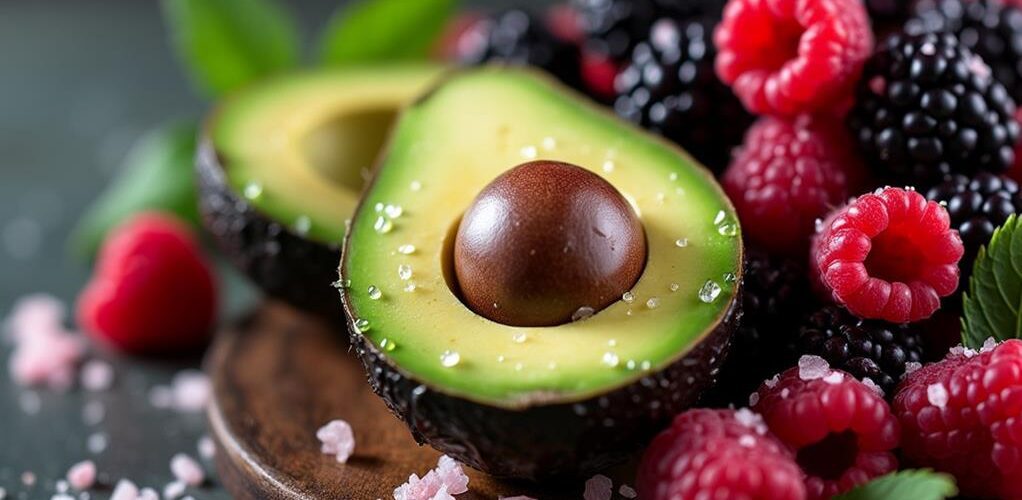
For those on a keto diet, avocados, lemons, raspberries, strawberries, and tomatoes can be excellent fruit choices. Avocados are loaded with heart-healthy fats and contain just 1.5 grams of net carbs per 100 grams. Lemons provide a boost of vitamin C and enhance flavor with minimal carbohydrate impact. Raspberries and strawberries offer antioxidant benefits, with low net carbs and high fiber content. Tomatoes add versatility to dishes with their low carbohydrate profile and rich nutrient content. Each of these fruits supports various aspects of health while aligning with keto dietary needs. Discover further details to optimize your keto-friendly fruit selections.
Key Takeaways
- Avocados are keto-friendly, with only 1.5 grams of net carbs per 100-gram serving and high healthy fats.
- Lemons add flavor with just 5.5 grams of carbs per fruit and are rich in vitamin C.
- Raspberries contain about 7 grams of net carbs per cup and are rich in antioxidants and fiber.
- Strawberries have approximately 8.7 grams of carbs per cup and are packed with vitamin C and antioxidants.
- Tomatoes provide only 5 grams of net carbs per cup and are versatile in recipes.
Avocados: A Keto Staple
Avocados are frequently considered a cornerstone of the ketogenic diet due to their exceptionally low net carbohydrate content and abundant nutritional profile. With only about 1.5 grams of net carbs per 100-gram serving, avocados are ideal for maintaining ketosis.
Their health benefits are numerous, especially their high content of heart-healthy monounsaturated fats, which have been shown to improve cholesterol levels and support cardiovascular health. Additionally, avocados are rich in essential vitamins, including vitamin K, vitamin E, and several B vitamins, alongside a substantial amount of potassium that aids in maintaining electrolyte balance.
Avocados are also packed with fiber, which is important for digestive health and helps extend the feeling of fullness, making them advantageous for weight management.
Beyond their nutritional benefits, avocados offer versatile recipe ideas suitable for a keto lifestyle. They can be transformed into flavorful salads, creamy smoothies, and nutritious spreads. Additionally, their creamy texture can enhance various keto recipes, making them a valuable addition to any meal plan.
Lemons: Flavor and Nutrition
Lemons offer a unique combination of flavor and nutrition, making them a valuable addition to a ketogenic diet. With approximately 5.5 grams of carbohydrates and 1.5 grams of fiber per fruit, lemons present a net carb count of about 4 grams. This low-carb profile aligns with the principles of a keto diet, allowing for flavorful enhancements without compromising dietary goals.
The juice from one lemon can effectively flavor multiple servings, providing a practical cooking tip for those aiming to enhance taste while maintaining a low-carb intake. In addition, lemons can help stabilize blood sugar levels, which is particularly beneficial for individuals managing diabetes.
The health benefits of lemons are substantial. Rich in vitamin C, they play an essential role in supporting immune function and may contribute to healthier skin due to their antioxidant properties. Moreover, the high pectin content found in lemons is beneficial for stabilizing blood sugar levels and promoting digestive health.
With only about 17 calories per fruit, lemons serve as a low-calorie flavor enhancer, adding zest and brightness to meals and beverages without significant carb impact.
Incorporating lemons into your diet can be as simple as using their juice in dressings, marinades, or teas, offering both culinary versatility and nutritional advantages.
Raspberries: Sweet and Low-Carb
Raspberries stand out as a delightful and keto-compatible fruit, thanks to their low net carbohydrate content of approximately 7 grams per cup. This makes them an excellent choice for those adhering to a ketogenic diet, where carbohydrate intake is limited.
Beyond their low-carb profile, raspberries are rich in antioxidants, which may help reduce inflammation and lower the risk of chronic diseases. Their high fiber content also supports digestive health, while essential vitamins and minerals, such as vitamin C and manganese, contribute to overall well-being.
Furthermore, the antioxidants in raspberries might aid in cognitive enhancement by combating oxidative stress, which is linked to brain health. Incorporating raspberries into your diet can be both health-enhancing and enjoyable.
Here are some practical recipe ideas and health benefits:
- Antioxidant-rich: May help combat oxidative stress and inflammation.
- Low-calorie: At only 65 calories per cup, they are a weight-loss-friendly option.
- Versatile in recipes: Perfect for smoothies, salads, or keto-friendly desserts.
- Nutrient-dense: Offers vitamin C and manganese, supporting immune function and bone health.
- Fiber-packed: Promotes satiety and aids in digestive health.
Strawberries: A Berry Delight
Strawberries, often celebrated for their vibrant color and revitalizing taste, present a viable option for those following a ketogenic diet due to their manageable carbohydrate content. With a net carb count of approximately 8.7 grams per one-cup serving, strawberries are a practical choice for those seeking to maintain ketosis while enjoying fruit.
Their richness in vitamin C, manganese, and antioxidants not only supports immune health but also potentially reduces inflammation, offering additional health benefits. Furthermore, the improved metabolic health associated with the ketogenic diet can be further supported by including nutrient-rich fruits like strawberries.
Incorporating strawberries into a keto-friendly diet is straightforward and versatile. They can be blended into invigorating strawberry smoothies, providing a nutrient-rich option that satisfies sweet cravings with only around 46 calories per cup. Additionally, strawberries can enhance the flavor and nutritional profile of salads, creating delicious strawberry salads that contribute to a balanced meal.
The fiber content in strawberries, approximately 3 grams per cup, is beneficial for digestion and promotes feelings of fullness. This can be particularly advantageous for weight management on a ketogenic diet, as it aids in controlling hunger and reducing overall calorie intake.
Tomatoes: Versatile and Tasty
Tomatoes, though often mistaken for vegetables, are botanically classified as fruits and serve as a versatile component of a ketogenic diet. With approximately 5 grams of net carbs per 1-cup (180-gram) serving, they fit well within the carb limits of keto plans. Their low caloric content, at just 32 calories per cup, adds to their appeal for those monitoring calorie intake.
Beyond their macronutrient profile, tomatoes offer significant nutritional benefits; they are rich in vitamins C and K and contain lycopene, an antioxidant associated with a reduced risk of chronic diseases. Additionally, tomatoes share similar nutritional highlights with bell peppers, as both are rich in vitamin C and antioxidants, enhancing their value in a keto diet.
Their culinary uses are vast, making them a staple in many kitchens. Fresh tomatoes can be added to salads, cooked into sauces, or used as a flavorful base for soups, enhancing dishes without adding substantial carbohydrates. This versatility allows for creativity in meal planning while adhering to dietary restrictions.
Consider the following benefits of incorporating tomatoes into your keto diet:
- Low in calories: Ideal for calorie-restricted diets.
- Rich in vitamins C and K: Supports overall health.
- Contains lycopene: May reduce chronic disease risk.
- High water content: Aids in hydration.
- Versatile in recipes: Suitable for salads, sauces, and soups.
Frequently Asked Questions
What Are the Best Fruits for Keto Diet?
For ideal keto fruit options, consider low carb fruits like avocados, raspberries, strawberries, tomatoes, and lemons. These fruits have favorable net carb counts, making them suitable choices for maintaining ketosis while enjoying diverse flavors and nutrients.
Can I Eat Fruit on Keto and Still Lose Weight?
Yes, you can consume fruit on a keto diet and still lose weight by practicing keto fruit selection with low-carb options such as berries, and adhering to strict fruit portion control to maintain ideal carbohydrate intake for ketosis.
Can You Go Into Ketosis if You Eat Fruit?
Yes, entering ketosis is possible when consuming certain fruits in moderation. Emphasizing ketosis benefits, one should prioritize low-carb fruit alternatives, such as avocados and berries, to maintain ketosis while still enjoying the nutritional advantages of fruit consumption.
How Many Fruits a Day on Keto?
To maintain ketosis, consume 1-2 servings of fruit daily, focusing on fruit portioning and low carb options. Prioritize fruits like berries, which contain 3-5 grams of net carbs per serving, fitting within keto dietary limits.
Conclusion
To summarize, incorporating keto-friendly fruits such as avocados, lemons, raspberries, strawberries, and tomatoes can enhance dietary variety while adhering to ketogenic guidelines. Each fruit offers unique nutritional benefits, from healthy fats in avocados to the antioxidant properties of berries. The low carbohydrate content of these fruits makes them suitable for a ketogenic diet, promoting both flavor and nutritional balance. These fruits support the diet's goals of maintaining low carbohydrate intake while providing essential nutrients and enhancing meal appeal.









No Comments